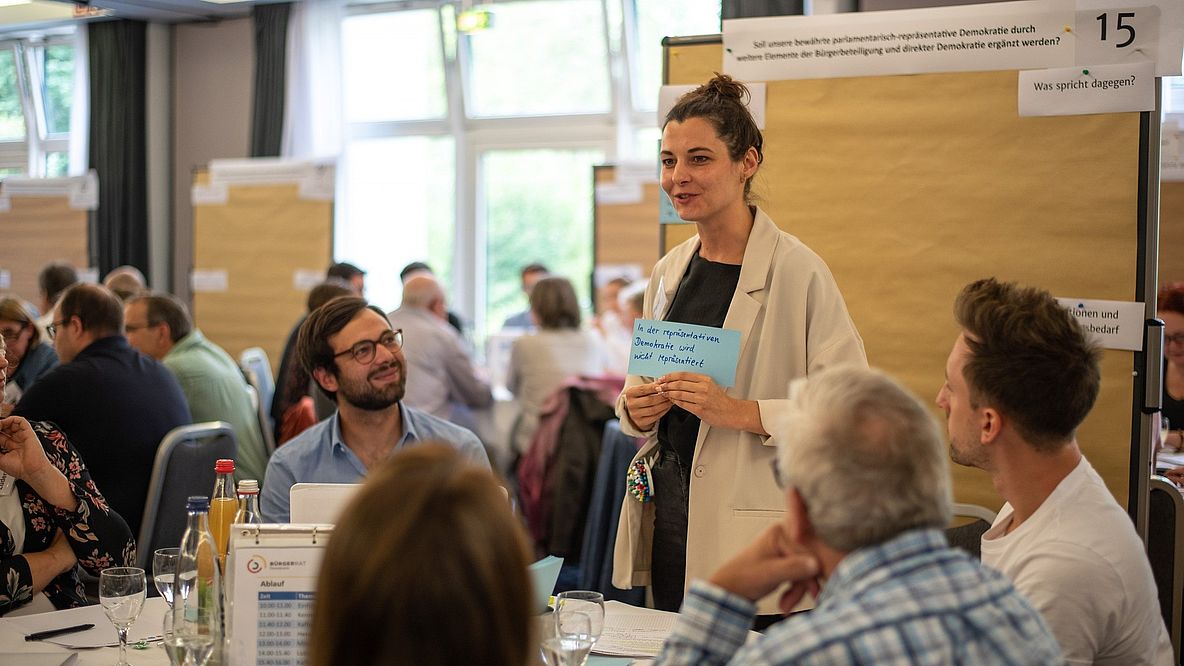Themes for Citizens' Assembly on "Germany's Role in the World" have been determined

Next year, 160 people drawn at random from all over the country will discuss "Germany's role in the world" in a Citizens' Assembly under the patronage of Bundestag President Wolfgang Schäuble. The individual topics to be discussed at the Citizens' Assembly have now been determined. The planned ten sessions, which will take place online, will focus on Germany's future role in the world in the areas of peace and security, economy and trade, democracy and the rule of law, sustainable development and the European Union.
To identify the topics to be debated by the Citizens’ Assembly, the organisers and implementing institutes have gathered inputs from many areas of society. In addition to a representative survey, there were four preparatory rounds online with randomly drawn participants who will not be present at the Citizens' Assembly itself. In addition, all parliamentary groups of the Bundestag and important civil society organisations were asked which topics they thought should be dealt with in the Citizens' Assembly. Foreign policy experts from ministries, institutes, associations and foundations also contributed their topics and questions.
"The five thematic areas have been chosen. The next thing is to make sure that the individual questions are helpful for politics. In addition, experts must be invited to bring those citizens who are selected to the same level of knowledge," says Claudine Nierth, spokesperson for the board of the association "Mehr Demokratie", which is organising the Citizens' Assembly together with the initiative "EsGehtLOS". "We have put a lot of work into the thematic preparation of this substantial topic in order to be able to really grasp and discuss it well. Now we are excited to see which policy suggestions a cross-section of the population will come up with." The randomly-selected Assembly will be conducted by ifok, IPG and Nexus, who are specialized in participation processes.
The first meeting of the Citizens' Assembly will take place on 13 January. From then until 20 February, the randomly-selected participants will deliberate on detailed questions regarding each of the five themes. They will meet online on six Wednesday evenings and on four Saturdays. The deliberation sessions will last a total of 50 hours. The people drawn by lot will receive support from experts who will offer them different perspectives on the individual topics and answer their questions during online lectures. All consultations are professionally moderated to ensure that everyone has an equal say. At the end of the consultations, recommendations for action on foreign policy will be voted on. These will be received by President of the Bundestag Schäuble and all parliamentary groups on 19 March in the form of a Citizens' Report.
Nearly 5,000 randomly drawn people from 67 municipalities, which have also been selected at random, have received an invitation to participate in the Citizens' Assembly in the past few days. All those invited can respond until 20 December. The final participants of the Citizens’ Assembly will then be chosen from those who responded. The aim is that they are as representative as possible of the population as a whole. For this reason, factors such as the age, gender, level of education and place of residence of participants are taken into account, but also if participants live in the city or on the countryside and if they have a migration background.
"We‘re bringing Germany together around one table! The more diverse the participants are, the better the results will be. And we do a lot to ensure that really all groups of society are represented in the Citizens' Assembly," explains Claudine Nierth. One positive effect of a citizens' assembly is that many people will become politically active for the first time through this participation process and then hopefully want to remain active. "Randomly-selected citizens' assemblies reflect the will of the entire population and can serve as a compass for politics," concludes Nierth.
More information: Finding topics for the Citizens' Assembly "Germany's role in the world"